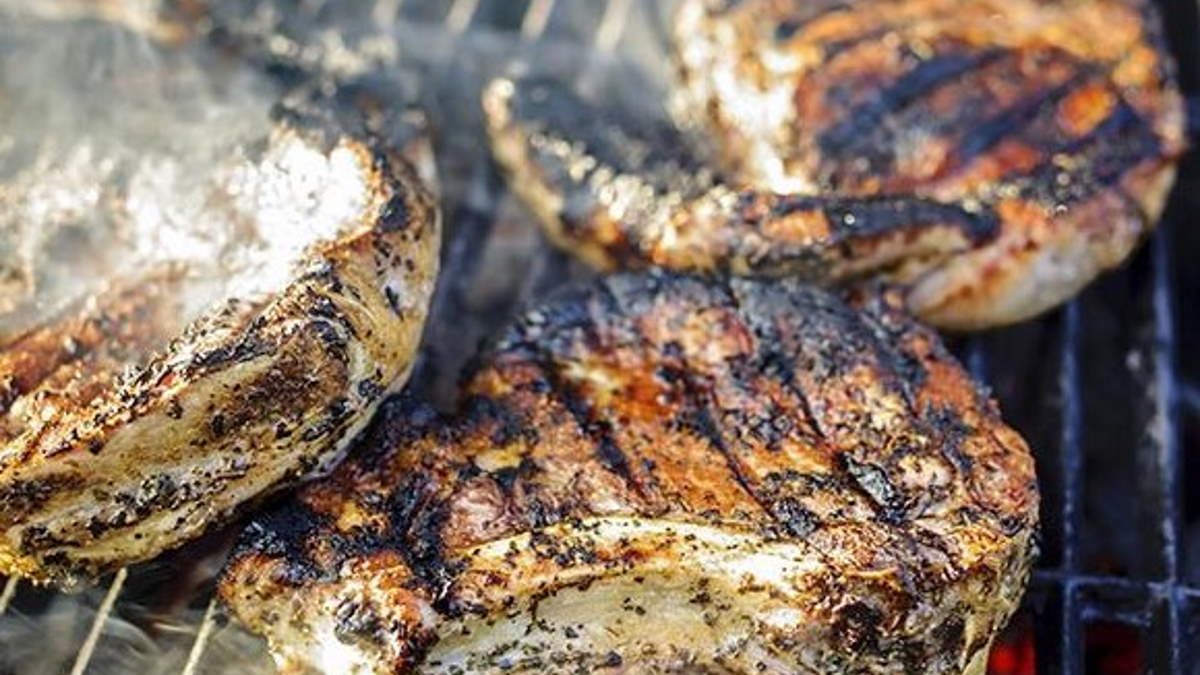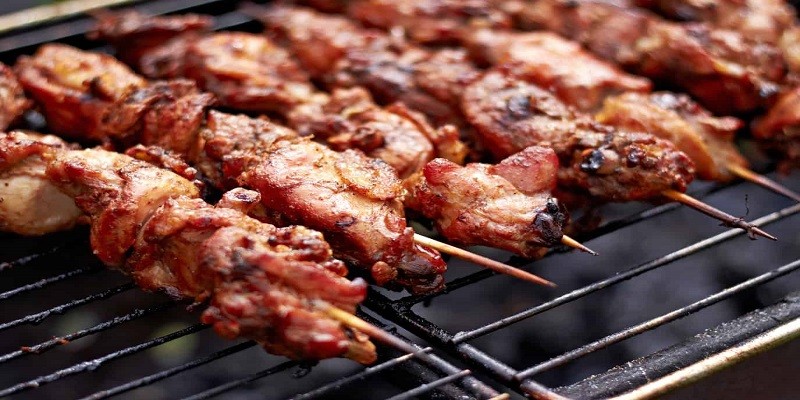Last Updated on January 15, 2025
Pregnant women can safely eat smoked, grilled, or BBQ meat as long as it is cooked thoroughly. However, it is important to be cautious and avoid meats that are not properly cooked or stored, as they can pose a risk of foodborne illnesses.
Pregnancy is a special time when women are mindful of what they eat to ensure the well-being of their baby. One common question that often arises is whether pregnant women can eat smoked, grilled, or BBQ meat. These cooking methods impart a smoky flavor and are popular choices for meat lovers.
However, it is essential for pregnant women to know the potential risks and benefits associated with consuming such meats during pregnancy. We will explore whether it is safe for pregnant women to indulge in smoked, grilled, or BBQ meat and provide some useful guidelines to ensure a healthy pregnancy. So, let’s dive in and find out what you need to know about enjoying these delicious dishes while expecting a bundle of joy.
Risks Associated With Consumption Of Smoked, Grilled, Or Bbq Meat During Pregnancy
During pregnancy, ensuring a balanced and nutritious diet is crucial for the health of both the mother and the developing baby. While it’s essential to include protein from various sources, including meat, certain cooking methods can pose potential risks. In this article, we will explore the risks associated with the consumption of smoked, grilled, or BBQ meat during pregnancy. It’s crucial to be aware of these risks to make informed decisions about your diet and prioritize the safety of both you and your baby.
Increased exposure to harmful substances
When smoked, grilled, or BBQ meat is prepared, it exposes the meat to high heat and can lead to the formation of harmful substances such as polycyclic aromatic hydrocarbons (PAHs) and heterocyclic amines (HCAs). These substances are formed when fat drips onto hot coals or flames and can potentially be harmful when consumed in large amounts.
During pregnancy, it is advisable to limit exposure to these substances as much as possible. Although the occasional consumption of smoked, grilled, or BBQ meat may not immediately lead to health issues, it’s essential to approach it with caution and aim for moderation. Reducing the consumption of meats cooked at high temperatures can potentially minimize exposure to these harmful substances.
Potential risk of foodborne illnesses
Another concern associated with consuming smoked, grilled, or BBQ meat during pregnancy is the potential risk of foodborne illnesses. When meat is not cooked thoroughly or is contaminated during the cooking process, it can harbor bacteria such as Salmonella, Listeria, or E. coli, which can cause severe infections and pose risks to both you and your developing baby.
To minimize the risk of foodborne illnesses, it is important to ensure that meat, especially poultry and ground meats, is cooked at the appropriate internal temperatures. The U.S. Food and Drug Administration (FDA) recommends cooking meat to a minimum internal temperature of 145°F (63°C) for whole cuts and 165°F (74°C) for ground meats. Using a meat thermometer can help ensure that the meat is properly cooked and safe for consumption during pregnancy.
Impact on overall nutritional intake
While consuming smoked, grilled, or BBQ meat occasionally may not have significant adverse effects, it’s important to consider the impact these cooking methods can have on your overall nutritional intake during pregnancy. Overreliance on these cooking techniques may lead to a reduced intake of essential nutrients, such as vitamins, minerals, and omega-3 fatty acids, which are vital for the healthy development of the baby.
To ensure a well-rounded and balanced diet, it is recommended to incorporate a variety of other protein sources into your meals, such as lean meats, poultry, fish, eggs, legumes, and dairy products. These alternatives provide essential nutrients that are necessary for the growth and development of both you and your baby.
Considering the potential risks associated with the consumption of smoked, grilled, or BBQ meat during pregnancy, it’s crucial to prioritize moderation and proper cooking techniques. Balancing your diet with a variety of protein sources and ensuring that all meats are cooked thoroughly will help minimize potential health risks and promote the well-being of both you and your baby during this crucial time.

Credit: www.chefstemp.com
Safe Practices For Enjoying Smoked, Grilled, Or Bbq Meat During Pregnancy
During pregnancy, many women have concerns about what they can and cannot eat. One popular question is whether it’s safe for pregnant women to indulge in smoked, grilled, or BBQ meat. While it’s important to take certain precautions, there are safe practices that can be followed to ensure that you can still enjoy these delicious dishes without compromising your health or the health of your baby. In this article, we will discuss the proper cooking and handling of meat, the importance of choosing lean cuts, and the benefits of marinating to reduce harmful substances.
Properly cooking and handling meat
When it comes to enjoying smoked, grilled, or BBQ meat during pregnancy, it is crucial to ensure that the meat is properly cooked and handled. This is because undercooked or raw meat can carry harmful bacteria such as salmonella or listeria, which can pose a risk to both you and your baby. To avoid any potential health hazards, follow these safe practices:
- Cook meat thoroughly: Make sure that the meat is cooked to safe internal temperatures. Use a meat thermometer to ensure that it reaches at least 145°F (63°C) for steaks, roasts, and fish, and 165°F (74°C) for ground meat. This helps to destroy any potential bacteria present in the meat.
- Keep raw and cooked meats separate: Prevent cross-contamination by using separate utensils, cutting boards, and plates for raw and cooked meats. This reduces the risk of bacteria from the raw meat coming into contact with your cooked meat.
- Wash hands and surfaces: Wash your hands thoroughly with soap and water before and after handling raw meat. Also, clean any surfaces, utensils, or cutting boards that have come into contact with raw meat to avoid the spread of bacteria.
Choosing lean cuts of meat
When it comes to smoked, grilled, or BBQ meat during pregnancy, choosing lean cuts is essential. Lean cuts of meat have less fat, which reduces the risk of excessive caloric intake and potential harmful substances. Opt for meats such as chicken, turkey, or lean cuts of beef or pork. Avoid meats with excessive marbling or visible fat.
Marinating to reduce harmful substances
Marinating meat before smoking, grilling, or BBQing can be a great way to reduce the formation of harmful substances such as heterocyclic amines (HCAs) and polycyclic aromatic hydrocarbons (PAHs). These substances are formed when meat is cooked at high temperatures and can be potentially harmful. Marinating meat with ingredients such as vinegar, lemon juice, or spices like rosemary and oregano can help reduce the formation of HCAs and PAHs.
Additionally, marinating meat can add flavor and tenderness to your dishes. Make sure to marinate the meat for at least 30 minutes before cooking to allow the flavors to penetrate.
By following these safe practices of properly cooking and handling meat, choosing lean cuts, and marinating to reduce harmful substances, you can enjoy smoked, grilled, or BBQ meat during pregnancy while ensuring the safety of both you and your baby. Remember to always consult with your healthcare provider to address any individual concerns or dietary restrictions related to your pregnancy.
Alternatives And Moderation For Pregnant Women Who Crave Smoked, Grilled, Or Bbq Meat
During pregnancy, many women experience strong cravings for smoky, grilled, or BBQ meats. However, it is important to be cautious and mindful of the potential risks associated with consuming these types of meats while pregnant. While there is no need to completely eliminate them from your diet, it is recommended to opt for alternatives, moderate your consumption, and seek professional advice for individual cases. This article will explore these suggestions in detail to help you make informed choices for a healthy pregnancy.
Opting for alternatives like grilled vegetables or tofu
When you find yourself craving the flavors and textures of smoked, grilled, or BBQ meats, consider opting for delicious alternatives that are safe for consumption during pregnancy. Grilled vegetables make a fantastic substitution, providing a similar smoky taste and a range of beneficial nutrients. You can experiment with a variety of vegetables such as zucchini, bell peppers, eggplants, or mushrooms to create a flavorful and satisfying meal. Another excellent option is tofu, which can be marinated and grilled to mimic the texture and taste of meat. These alternatives not only satisfy your cravings but also contribute to a well-balanced diet for both you and your baby.
Moderating consumption of smoked, grilled, or BBQ meat
While it is generally safe to consume smoked, grilled, or BBQ meat during pregnancy, it is important to moderate your intake to minimize potential risks. The process of smoking and grilling meat at high temperatures can lead to the formation of harmful compounds, such as polycyclic aromatic hydrocarbons (PAHs) and heterocyclic amines (HCAs), which may have adverse effects on fetal development. To mitigate these risks, limit your consumption of these meats to once or twice a week, ensuring they are cooked thoroughly and not charred. Additionally, consider reducing portion sizes and complementing your meal with a variety of other nutritious options, such as whole grains, fresh fruits, and vegetables.
Seeking professional advice for individual cases
Each pregnancy is unique, and individual circumstances may vary. If you have concerns or specific dietary restrictions, it is always best to seek professional advice from your healthcare provider or a registered dietitian. They can provide personalized recommendations based on your medical history, nutritional needs, and pregnancy progression. Remember, their expertise will ensure that you make the best decisions for your health and the well-being of your baby.
It is possible for pregnant women to satisfy their cravings for smoked, grilled, or BBQ meat through alternatives like grilled vegetables or tofu. Additionally, moderating consumption and seeking professional advice for individual cases can help minimize potential risks. By making informed choices and maintaining a well-balanced diet, you can enjoy a healthy and enjoyable pregnancy.
Frequently Asked Questions On Can Pregnant Women Eat Smoked, Grilled Or Bbq Meat?
Can Pregnant Women Eat Smoked Meat?
Pregnant women should avoid eating smoked meat due to the risk of foodborne illnesses such as listeria.
Is It Safe For Pregnant Women To Eat Grilled Meat?
Grilled meat can be safe for pregnant women as long as it is cooked thoroughly to kill any harmful bacteria.
Can Pregnant Women Consume Bbq Meat?
Pregnant women should be cautious when consuming BBQ meat to ensure it is cooked at the right temperature to eliminate any potential risks.
Are There Any Risks Of Eating Smoked, Grilled, Or Bbq Meat While Pregnant?
Yes, pregnant women need to be aware of the risks associated with eating smoked, grilled, or BBQ meat, including potential bacterial contamination.
What Are The Alternatives To Smoked, Grilled, Or Bbq Meat For Pregnant Women?
Pregnant women can opt for safer alternatives like well-cooked, roasted, or sautéed meat to minimize the risk of foodborne illnesses.
Conclusion
Pregnant women should exercise caution when consuming smoked, grilled, or BBQ meat due to potential food safety risks. It is essential to ensure that the meat is thoroughly cooked to kill any harmful bacteria and to avoid cross-contamination. Prioritizing hygiene, choosing high-quality sources, and following proper cooking practices can help minimize these risks and ensure a safe and enjoyable dining experience for expectant mothers.

